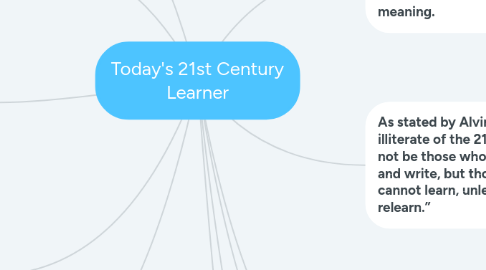
1. In taking on the task of educating students, educators have a huge responsibility. Yet, none greater than helping students rid their resistant to new ideas and concepts, or developing new perspectives of how to do what they know better.
2. While the task may appear simple, encouraging students to be independent thinkers and doers is quite challenging.
3. Young students are often programed to depend on their teacher, therefore to encourage students to become independent learners is a huge transition. In fact, the job of the teacher is to move from demanding compliance and shift the responsibility of learning to students (Crockett, Jukes, & Churches, 2011).
4. Helping students to embrace independence extends beyond recall.
4.1. Therefore, encouraging students to learn, relearn, and achieve success I plan on enabling students to interpret and apply information to new situations, problems, and environments.
4.2. They recognize concepts as being necessary beyond the classroom as well as those that can be utilized in their everyday lives.
4.3. Therefore, encouraging students to learn, relearn, and achieve success I plan on enabling students to interpret and apply information to new situations, problems, and environments.
5. Technology is a big component in assisting students in becoming independent learners.
6. Education must change for today’s learners. In observing the changes that the workforce is requiring of employees, education takes on a new meaning.
7. As stated by Alvin Toffler, “The illiterate of the 21st century will not be those who cannot read and write, but those who cannot learn, unlearn, and relearn.”
8. Teaching students to learn, unlearn, and relearn offers numerous benefits. In addition to preparing students with skills that they are able to internalize, students are able to understand the relevance of skills such that they can apply them in a global world beyond school.
8.1. In fact, education is no longer short-term goals rather opportunities to identify skills, knowledge, and habits that allow learners to thrive in the 21st century.
8.1.1. They recognize concepts as being necessary beyond the classroom as well as those that can be utilized in their everyday lives. Thus, learners become discerning and creative consumers of information who can manage, interpret, validate, transform, communicate, and act on information (Crockett et al., 2011).
8.1.1.1. These skills permit learners to embrace problem solving, creativity, ethics, analytical thinking, collaboration, as well as accountability. As stated by David Thornburg, educators must embrace "holodeck" classrooms that support project-based learning and change the role of the teacher from lecturer to exploration guide (Eutopia, 2012)
8.1.2. They recognize concepts as being necessary beyond the classroom as well as those that can be utilized in their everyday lives. Thus, learners become discerning and creative consumers of information who can manage, interpret, validate, transform, communicate, and act on information (Crockett et al., 2011).

